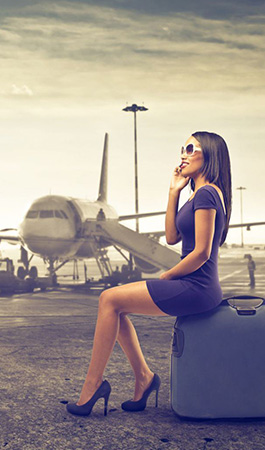Selecting the perfect accommodation can make or break your travel experience. Whether you’re a luxury seeker, budget backpacker, digital nomad, or family traveller, understanding your travel style is crucial in finding the ideal place to stay. With an ever-expanding array of options available, from traditional hotels to unique alternatives like treehouses and monasteries, choosing the right accommodation has become both exciting and challenging.
This comprehensive guide will explore various accommodation types, helping you navigate the complex landscape of travel lodging. We’ll delve into the nuances of different travel styles, compare traditional options, and uncover alternative choices for those seeking unique experiences. Moreover, we’ll examine how technology is revolutionising the way we select and book accommodations, ensuring you make informed decisions that align perfectly with your travel preferences.
Analyzing travel styles and accommodation preferences
Understanding your travel style is the first step in choosing the right accommodation. Are you someone who prioritises luxury and comfort, or do you prefer a more adventurous, budget-friendly approach? Perhaps you’re a digital nomad seeking long-term stays with reliable Wi-Fi, or a family looking for spacious, child-friendly options. Your travel style significantly influences your accommodation needs and preferences.
Luxury travellers often prioritise high-end amenities, personalised service, and exclusive experiences. Budget travellers, on the other hand, focus on affordability and basic comforts, often valuing social interactions over lavish surroundings. Digital nomads require a balance of comfort, functionality, and community, while family travellers need space, safety, and family-oriented facilities.
Consider your typical daily routine when travelling. Do you spend most of your time exploring the destination, or do you enjoy lounging in your accommodation? Are you looking for a place that offers immersive local experiences, or do you prefer the familiarity and consistency of international hotel chains? By answering these questions, you can narrow down your accommodation options and focus on those that best suit your travel style.
Hotels vs. hostels: comparative analysis for different traveler types
The classic debate between hotels and hostels continues to be relevant for many travellers. Each option caters to different needs and preferences, making it essential to understand their unique characteristics and how they align with various travel styles.
Luxury seekers: Five-Star hotels and boutique accommodations
For those who prioritise comfort, service, and amenities, luxury hotels and boutique accommodations are often the go-to choice. Five-star hotels offer a range of high-end facilities, from spa services to Michelin-starred restaurants. They provide a consistent level of luxury and comfort, ideal for travellers who value predictability and top-notch service.
Boutique hotels, while often smaller, offer a more personalised and unique experience. These establishments frequently showcase local design, art, and culture, providing a more intimate and tailored stay. Luxury seekers appreciate the attention to detail, exclusive experiences, and often prime locations that these accommodations offer.
Budget backpackers: hostel dormitories and social spaces
On the other end of the spectrum, hostels cater to budget-conscious travellers and those seeking social interactions. Dormitory-style rooms, reminiscent of student accommodation, offer affordable accommodation, often with shared facilities. While this may not appeal to everyone, it’s an excellent option for solo travellers looking to meet new people and share experiences.
Many modern hostels have evolved beyond basic dormitories, offering private rooms, co-working spaces, and organised social activities. These features make hostels increasingly attractive to a broader range of travellers, including digital nomads and even budget-conscious couples.
Digital nomads: co-living spaces and extended stay options
The rise of remote work has led to an increased demand for accommodations that cater to digital nomads. Co-living spaces and extended stay options have emerged to meet this need, offering a blend of private living quarters and communal areas designed for work and socialisation.
These accommodations typically provide reliable high-speed internet, dedicated workspaces, and opportunities to connect with like-minded individuals. Many also offer flexible lease terms, making them ideal for nomads who may stay in one location for weeks or months at a time.
Family travelers: Suite-Style rooms and apartment hotels
Families often require more space and specific amenities to ensure a comfortable stay. Suite-style rooms in hotels and apartment hotels have become popular choices for family travellers. These accommodations offer separate living and sleeping areas, kitchenettes or full kitchens, and often include family-friendly facilities such as pools, playgrounds, and kids’ clubs.
Apartment hotels, in particular, provide a home-away-from-home experience, allowing families to maintain routines and save on dining costs by preparing meals in their unit. The added space and home-like amenities make these options particularly attractive for longer family stays.
Alternative accommodation options for unique travel experiences
For travellers seeking experiences beyond traditional hotels and hostels, a world of alternative accommodations awaits. These unique options can provide immersive, memorable stays that become an integral part of the travel experience itself.
Airbnb and VRBO: navigating the sharing economy
The sharing economy has revolutionised the accommodation industry, with platforms like Airbnb and VRBO offering a vast array of unique stays. From city apartments to countryside cottages, these platforms allow travellers to find accommodation that suits their specific needs and preferences.
Staying in a private home or apartment can provide a more authentic local experience, often at a lower cost than traditional hotels. However, it’s important to carefully read reviews, understand cancellation policies, and communicate clearly with hosts to ensure a smooth experience.
Glamping and Eco-Lodges: sustainable travel accommodations
For those who love nature but don’t want to sacrifice comfort, glamping (glamorous camping) and eco-lodges offer an ideal solution. These accommodations allow travellers to immerse themselves in natural surroundings while enjoying amenities that range from basic to luxurious.
Glamping options can include yurts, safari tents, or even converted airstream trailers, often equipped with comfortable beds, en-suite bathrooms, and sometimes even air conditioning. Eco-lodges focus on sustainability, often using renewable energy sources and locally sourced materials, appealing to environmentally conscious travellers.
Houseboats and treehouses: unconventional stays for adventure seekers
For those looking for truly unique experiences, accommodations like houseboats and treehouses offer unforgettable stays. Houseboats, popular in destinations like Amsterdam and Kerala, India, allow travellers to experience life on the water, often with the ability to navigate and explore waterways.
Treehouses, ranging from rustic to luxurious, provide a childhood dream come true for many adults. These elevated accommodations offer unique perspectives of their surroundings, whether in a tropical rainforest or a serene woodland setting.
Monasteries and temples: cultural immersion through religious stays
For travellers seeking spiritual experiences or deep cultural immersion, stays in monasteries or temples can provide unique insights. Many religious institutions around the world offer accommodation to visitors, ranging from simple rooms to more comfortable guest houses.
These stays often come with the opportunity to participate in religious ceremonies, meditation sessions, or even periods of silent reflection. While typically basic in terms of amenities, the cultural and spiritual value of these experiences can be immeasurable for the right traveller.
Location-specific accommodation choices
The location of your accommodation plays a crucial role in shaping your travel experience. Different destinations offer unique accommodation options that can enhance your stay and provide a deeper connection to the local environment and culture.
Urban centers: proximity to landmarks vs. local neighborhoods
In cities, travellers often face the choice between staying in central locations near major landmarks or opting for accommodations in more residential neighbourhoods. Central locations offer convenience and easy access to tourist attractions but can be noisy and more expensive.
Staying in local neighbourhoods, on the other hand, can provide a more authentic experience of city life. These areas often offer cheaper accommodation options, local eateries, and a chance to experience the city as a resident rather than a tourist. Consider your priorities – is easy access to attractions more important, or do you value a quieter, more local experience?
Coastal destinations: beachfront resorts vs. inland options
In coastal areas, the allure of beachfront accommodation is strong. Resorts and hotels directly on the beach offer unparalleled views and easy access to the shore. However, these options often come at a premium price and can be crowded during peak seasons.
Inland accommodations, while not offering immediate beach access, can provide a more peaceful environment and often at a lower cost. Many inland options still offer sea views and may be closer to local towns and cultural attractions. Consider how much time you plan to spend on the beach versus exploring other aspects of your destination.
Rural retreats: farm stays and country inns
Rural destinations offer unique accommodation experiences that allow travellers to connect with nature and local ways of life. Farm stays, for instance, provide an opportunity to experience agricultural life firsthand, often with the chance to participate in farm activities or enjoy farm-to-table dining.
Country inns and bed and breakfasts offer a more traditional rural accommodation experience, often in historic buildings with charming decor and personalised service. These options are ideal for travellers looking to escape the hustle and bustle of city life and enjoy a slower pace in picturesque surroundings.
Technological advancements in accommodation selection
Technology is rapidly changing the way we search for, book, and experience travel accommodations. These advancements are making it easier for travellers to find the perfect stay that aligns with their preferences and travel style.
Ai-powered booking platforms: personalized recommendations
Artificial Intelligence is revolutionising the accommodation booking process. AI-powered platforms can analyse your past travel behaviour, preferences, and current search parameters to provide highly personalised recommendations. These systems can take into account factors like your preferred amenities, budget range, and even the types of experiences you enjoy to suggest accommodations that are likely to suit your needs.
As these systems become more sophisticated, they can even predict your preferences before you explicitly state them, making the search process more efficient and tailored to your individual travel style.
Virtual reality tours: Pre-Stay room inspections
Virtual Reality (VR) technology is offering travellers the opportunity to ‘visit’ their potential accommodation before making a booking. Many hotels and vacation rentals now offer VR tours of their properties, allowing guests to explore rooms, facilities, and even the surrounding area in immersive 3D environments.
This technology is particularly useful for travellers who want to ensure that the accommodation meets their specific needs, such as families checking for child-friendly spaces or business travellers verifying the suitability of work areas. VR tours can significantly reduce the risk of disappointment upon arrival and help travellers make more informed decisions.
Blockchain in hospitality: secure transactions and loyalty programs
Blockchain technology is beginning to make inroads in the hospitality industry, offering potential benefits in terms of security, transparency, and efficiency. For travellers, blockchain can provide more secure payment methods and protect personal data during transactions.
Additionally, blockchain-based loyalty programs are emerging, allowing travellers to earn and redeem points across multiple platforms and services. This technology could lead to more flexible and valuable reward systems, benefiting frequent travellers and enhancing the overall accommodation booking experience.
Legal and safety considerations in accommodation choice
While focusing on comfort and experience is important, it’s equally crucial to consider legal and safety aspects when choosing accommodation. These factors can significantly impact your travel experience and provide peace of mind during your stay.
Regulatory compliance: Short-Term rental laws by destination
The rise of short-term rentals through platforms like Airbnb has led to various regulatory responses in different destinations. Some cities have strict laws governing short-term rentals, which can affect the availability and legality of certain accommodation options.
Before booking a short-term rental, research the local regulations to ensure that your stay complies with local laws. This can help you avoid potential issues with authorities and ensure that your accommodation meets safety and quality standards set by local regulators.
Travel insurance: coverage for various accommodation types
When choosing accommodation, consider how it aligns with your travel insurance coverage. Some insurance policies may have limitations or exclusions for certain types of accommodation, such as shared spaces or unconventional stays like treehouses or houseboats.
Review your travel insurance policy carefully and consider whether you need additional coverage based on your accommodation choices. This is particularly important for longer stays or when opting for unique or adventurous accommodation options.
Health and safety protocols: Post-Pandemic accommodation standards
The global pandemic has led to increased focus on health and safety measures in all types of accommodation. When choosing where to stay, consider the health and safety protocols implemented by the property. Look for information about cleaning procedures, social distancing measures, and any specific health-related amenities or services offered.
Many accommodation providers now offer contactless check-in and enhanced cleaning protocols. Some have also implemented new technologies like UV sanitisation or air purification systems. Evaluate these factors based on your personal comfort level and health considerations to ensure a safe and enjoyable stay.
By considering these legal and safety aspects alongside your preferences for comfort and experience, you can make a well-rounded decision about your accommodation. Remember that the right choice not only enhances your travel experience but also provides the necessary peace of mind to fully enjoy your journey.


